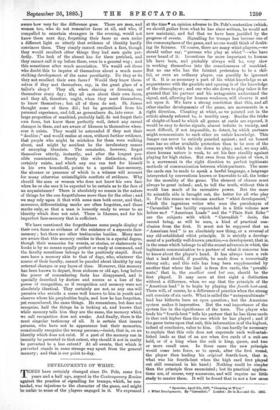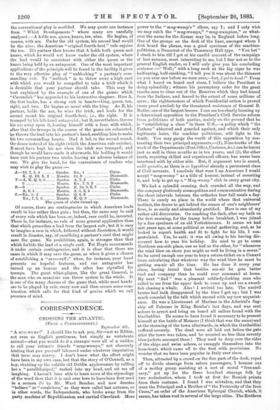DEVELOPMENTS OF WHIST.
MIMES have certainly changed since Dr. Pole, some five years and a half ago, argued in the Contemporary Beview against the practice of signalling for trumps, which, he con- tended, was injurious to the character of the game, and might be unfair to some of the players engaged in it. We expressed
at the time * an opinion adverse to Dr. Pole's contention (which, we should gather from what he has since written, he would not now maintain), and feel that we have been justified by the progress of events. Signalling for tramps has become one of the commonplaces of the game, and no one would think of doubt- ing its fairness. Of coarse, there are many whist-players,—we should rather say, " persons who play at whist "—who have never heard of it. Inventions far more important to human life have been, and probably always will b3, very slow in working themselves into the consciousness of mankind. But no one who has the faintest pretension to be a skil- ful, or even an ordinary player, can possibly be ignorant of it. It is as necessary a part of his whist-knowledge as an acquaintance with the gambits and opening is of the knowledge of the chess-player ; and one who sits down to play takes it for granted that his partner and his antagonists understand the signal, and, allowing for human weakness, will observe it and act upon it. We have a strong conviction that this, and all other similar developments of the game, are movements in a right direction. Cheating at whist, as we pointed out in the article already referred to, is terribly easy. Besides the tricks of sleight-of-hand to which all games at cards are exposed, it would be easy to devise signals, almost infinite in variety, and most difficult, if not impossible, to detect, by which partners might communicate to each other an unfair knowledge. This danger can never be entirely guarded against ; and an honest man has no other available protection than to be sure of the company with which he sits down to play ; and, we may add, since human nature is weak, to set his face steadily against playing for high stakes. But even from this point of view, it is a movement in the right direction to perfect legitimate methods of communication between whist-partners. The more the cards can be made to speak a lawful language, a language interpreted by conventions known or knowable to all, the better for the morality of the game. The element of chance must always be great indeed ; and, to tell the truth, without this it would lose much of its recreative power. But the more its scientific side is brought out, the better for all who play it. For this reason we welcome another " whist development," which the ingenious writer who uses the pseudonym 13f " Cavendish " has lucidly expounded in a little volume now before ns.i. "American Leads" and the "Plain Suit Eoho " are the subjects with which " Cavendish " deals, the second being, as will be seen, a kind of practical con- clusion from the first. It must not be supposed that an "American lead " is an absolutely new thing, or a reversal .of any old-established whist principle. It is strictly a develop- ment of a perfectly well-known practice,—a development, that is, in the sense which belongs to all the recent advances in whist, the legitimate communication to a partner of what it concerns him to know about the player's hand. It has always been a rule that a lead should, if possible, be made from a numerically strong suit ; and this rale has long been supplemented by another that where the lead is from five cards, the ' penulti- mate,' that is, the smallest card but one, should be the first played. It may seem at first sight a distinction without a difference, when we say that the principle of the "American lead " is to begin by playing the fourth best-card. There will, of course, be a difference of practice when the strong suit consists of six cards. What is called the " antepenultimate" lead has hitherto been an open question ; but the American system makes it imperative. But the real importance of the system lies in the significance of the term. The player who leads his " fourth-best " tells his partner that he has three cards in that snit higher than the one which he has played ; and if the game turns upon that suit, this information is of the highest, indeed of conclusive, valve to him. (It can hardly be necessary to explain that this rule does not supersede such well-estab- lished leads as that of an ace when five cards of a suit are held, or of a king when the suit is king, queen, and two or more small ones. In these cases the new principle would come into force, so to speak, after the first round, the player then leading his original fourth-best, that is, what was his fourth-best when the high card first played out still remained in his hand.) Nothing could be simpler than the principle thus enunciated ; but its practical applica- tions are, of coarse, very numerous, and will require no little study to master them. It will be found that in not a few cases
• Spectator, April 5th, 1879, "Cheating at Whist." I. Whist Developments. By " Cexendisb." Losylon: De la Rea and Co. MS.
the conventional play is modified. We, may quote one instance from " Whist Developments " where many are carefully analysed : —A holds ace, queen, knave, ten, nine. He begins, of course, with ate. Under the old system, his second lead would be the nine ; the American "original fourth-best " rule enjoins the ten. His partner then knows that A holds both queen and knave, which he would not know under the old system, where the lead would be consistent with either the queen or the knave being held by an antagonist. One of the most important applications of the principle will be found in the facility it gives
to the very effective play of " unblocking " a partner's com- manding suit. To " unblock " is to throw away a high card with which you would be compelled to take a trick which it is desirable that your partner should take. This may be best explained by the example of one of the games which "Cavendish" has appended to his instructive chapters. Here A, the first leader, has a strong suit in hearts—king, queen, ten,
eight, and two. He begins as usual with the king. As B, his partner, holds the ace, be wins the trick, and leads for the second round his original fourth-best, i.e., the eight. It is trumped by his left-hand antagonist ; but B, nevertheless, throws his ace away upon it, leaving himself with a four, with which, after that the tramps in the course of the game are exhausted, he throws the lead into his partner's hand, enabling him to make his two commanding hearts. Had A led, in the second round, the deuce instead of his eight (which the American rule enjoins), B must have kept his ace when the trick was trumped; and though he would have made it afterwards, his holding it would have cost his partner two tricks, leaving an adverse balance of one. We give the hand, for the convenience of readers who may wish to play the game :-
A.-10, 7, 5, 4 Spades. Kn., 4 Clubs.
K, Q, 10, 8, 2 ... Hearts. 10, 8 Diamonds.
Y.—A, K, Q, 8, 6 Spades. A, 7, 2 Clubs.
6 Hearts. Kn., 7, 3, 2 Diamonds.
B.-3 Spades. K, 10, 9, 6, 5 Clubs.
A, 9, 4 Hearts. A, 6, 5, 4 Diamonds.
Z.—Kn., 9, 2 Spades. Q, 8, 3 Clubs. Ku., 7, 5, 3 Hearts. K, Q, 9 Diamonds.
The queen of dabs turned up.
Of course, there are contingencies in which American leads result in loss rather than gain ; but then, the same may be said of every rule which has been, or, indeed, ever could be, invented. There is, for instance, no rule of more general application than that which prescribes a lead from the largest snit ; but it is easy to imagine a case in which, followed without discretion, it would result in disaster, say, of sacrificing a partner's card that might save the game. No prohibition, again, is stronger than that which forbids the lead of a single card. Yet Hoyle recommends it under certain contingencies, and it is clear that there are cases in which it may save the game, as when it gives a chance of establishing a "cross-ruff;" when, for instance, your hand presents no hopeful features, and one antagonist has turned up an honour and the other has signalled for trumps. Tke great whist-player, like the great General, is the man who on occasions can throw system to the winds. It is one of the many charms of the game that, while most hands are to be played by rule, every now and then occurs some com- bination which calls for that kind of genius which we call presence of mind.



































 Previous page
Previous page